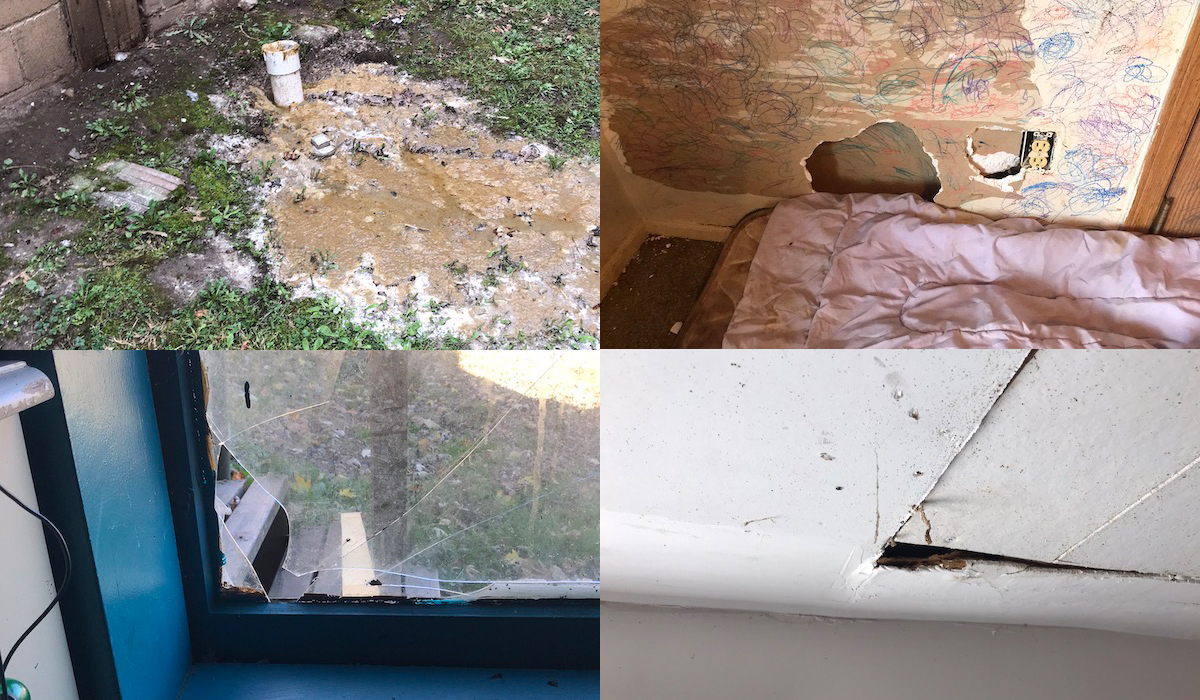
Raw sewage, gaping holes in walls, bug-infested ceilings and broken windows are some of the issues health department workers may find when inspecting substandard rental properties in Athens County. [Photos provided by Athens City-County Health Department]
Tenants in Athens County live in squalor as markets and regulations fail to meet the need
Facing few regulations and little competition, some landlords rent out derelict properties with glaring health and safety problems. Tenants who try to fight back risk ending up homeless.

Anna picks up her house and turns it around slowly.
The front porch is about a foot long. There are two windows with green trim and a door frame with a photo of a smiling child inside. One of the windows has a dog’s toy bone stuck to it. The other has a small white block with the words “we reap what we sow” painted in tiny letters. On the roof, Anna has attached pink cutout letters that read “princess diva.”
It’s an old art therapy project Anna now keeps at a peer recovery center she frequents. A few of her other pieces are nearby: a colorfully painted toy truck, a small birdhouse.

Anna’s toy house and other assorted art projects. [Theo Peck-Suzuki | WOUB/Report for America]
The trailer Anna lived in with her daughter and grandson was nothing like her toy house.
“You know the old metal homes that you see abandoned on the side of the road, and that’s exactly what it looks like,” Anna said. “I used to call it my matchbox for a little while ... because if that thing caught on fire, you’d be gone in an instant.”
Anna — who agreed to speak with WOUB on the condition that her real name not be used — has PTSD and other psychiatric conditions and receives disability. The “matchbox” was all she could afford in Athens County, and only because the property was deemed eligible for federal rent assistance through Section 8.
The trailer was plagued with problems from the day she moved in.
“The floor was leaking. They fixed it, supposedly. ... My rug would be wet where they had supposedly fixed it. I kept telling them about it. And just, throughout the years of me saying, ‘Hey, I’m getting mold, I’m getting rain. I’m getting rain coming through my electric sockets. I’m getting rain coming through my light fixtures. A big boom, hello?’” Anna said.
The light in her bathroom wouldn’t turn on, which Anna attributed to water regularly getting into the socket.
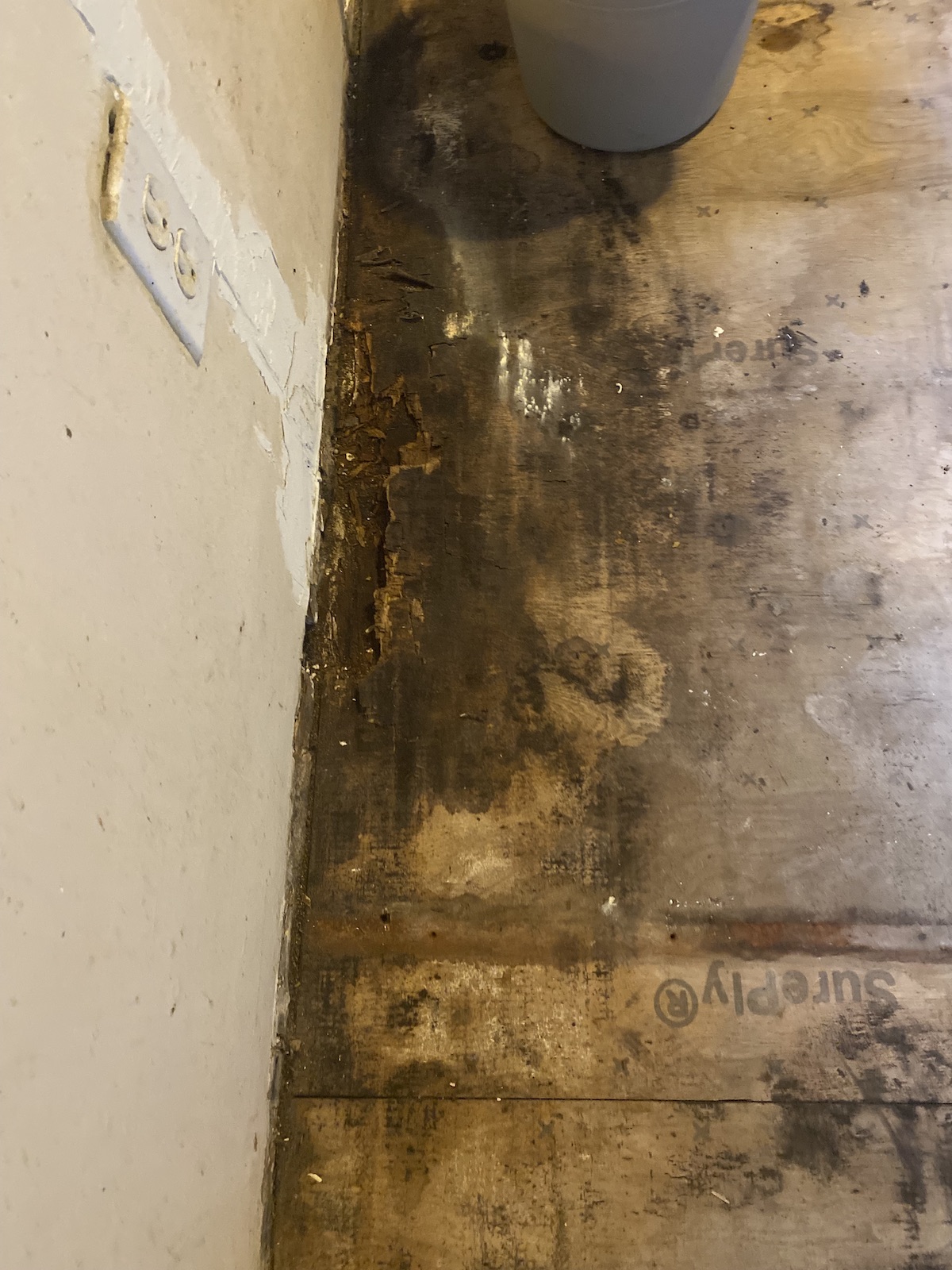
A water leak severely damaged Anna’s kitchen floor. The board next to the wall is badly deteriorated. [Photo provided by Anna]
These are some of the squalid conditions facing low-income tenants in Athens County and beyond. With nowhere else to go, they are stuck paying rent to landlords who make little to no effort to keep their properties maintained. Those who complain can find themselves kicked out, with few legal remedies available. The problem is widespread and known to local officials, but thus far, no one has been able to solve it.
Virtually everyone agrees on what the solution should be: increasing the stock of quality affordable housing so that low-income tenants like Anna can move out of substandard units. But as WOUB has learned over months of reporting, no one can build the necessary homes. A complex web of high costs, supply and labor shortages, building restrictions, real estate investment practices and administrative hurdles has stifled housing development across the region and throughout the United States.
Nor can these tenants afford to simply terminate their leases early. For many, doing so would mean homelessness. The demand for housing so outpaces supply that people will accept raw sewage on the floor or exposed wiring hanging from the ceiling if it means a roof over their heads. Section 8 voucher holders like Anna may also lose their voucher if they leave their home and can’t find somewhere else to live fast enough.
As a result, people are stuck in homes that are quite literally falling apart around them.
Sewage and bad wiring
The substandard housing problem in southeast Ohio is both widespread and easy to miss. Tenants who live in substandard units are often extremely vulnerable, and many don’t want to risk provoking a landlord by whom they may already feel threatened. Some are caught up in problematic rent-to-own agreements or other dubious quid-pro-quos. It’s also just not easy for a person who is under constant financial pressure to advocate for themselves.
Often, it is the people who work with lower-income populations — health department officials, legal aid attorneys, Habitat for Humanity workers — who end up sharing most of the horror stories.
“I’ve seen a lot. I’ve seen raw sewage running under homes. I’ve seen broken windows in the middle of winter, no heat in the middle of winter, no running water,” said Caitlyn McDaniel, an attorney with Legal Aid of Southeast and Central Ohio (former Southeast Ohio Legal Services). “Faulty wiring, that comes up a lot. Like bad fire hazards, that kind of stuff. That definitely comes up a lot.”
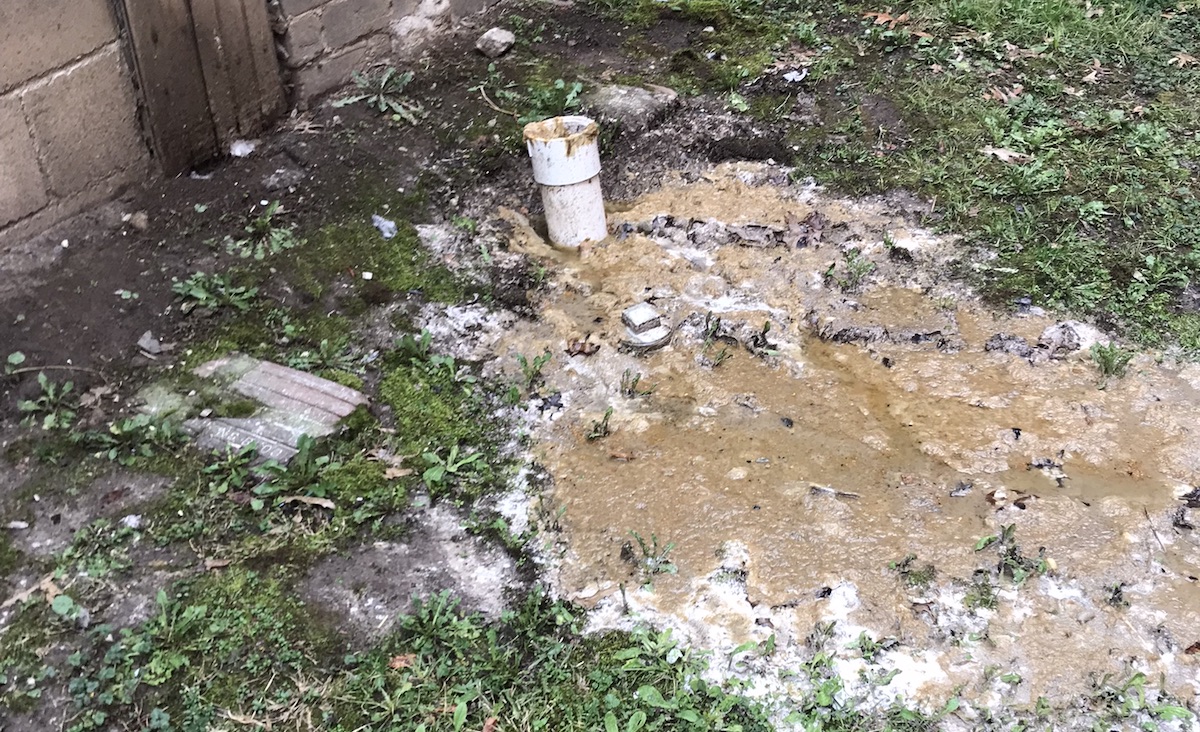
An open sewage line vents raw sewage directly into someone’s yard. [Photo provided by Athens City-County Health Department]
Habitat for Humanity of Southeast Ohio Executive Director Kenneth Oehlers believes the reason no one recognizes substandard housing is that it has been normalized in many communities.
“We drive by it on a daily basis and we don’t even see it anymore. It’s just part of the landscape. And that’s a problem. That’s a problem because the people that are living there are living in substandard conditions,” he said.
According to Oehlers, Habitat for Humanity does 20 to 25 home repairs a year, primarily on roofs and bathrooms. It’s nowhere near enough to address the mass of decaying housing stock in his organization’s service area.
“If I had $25 million right now, it would not be able to touch all the repairs for low-income families throughout Athens County. Probably there are some houses that need $50,000 worth of work on them, and we may have 5,000 that we can put towards it,” Oehlers said.
“If we don’t put investment into preserving the current housing stock,” he said, “we’re going to continue to have housing stock issues, because houses are living breathing things. If we don’t take care of ’em, like we take care of our bodies, they will decay.”
Many of them have already decayed so badly that they would be declared unfit for human habitation if a regulator ever came out to inspect them. That still doesn’t stop landlords from renting them out, however. It’s a simple problem of supply and demand: If supply is constrained, demand remains high.
In other words, as long as there’s nowhere else low-income people can afford to live, even the worst landlords will always have tenants.
Isn’t this illegal?
In theory, a tenant can take legal action against a landlord who refuses to, say, fix a broken heating system. In practice, a raft of systemic issues makes this extremely risky. There is no right to counsel in the state of Ohio for tenant/landlord disputes, meaning low-income tenants have to rely on legal aid attorneys who are probably stretched thin. Those who do get a lawyer and file a lawsuit may find themselves kicked out of their home, and the legal protections against retaliation are often inadequate.
When Zack Eckles worked as an attorney with Legal Aid of Southeast and Central Ohio, he saw many clients who rented from, as he put it, “landlords of last resort.” He also witnessed just how little tenants could do to hold their landlords to account.
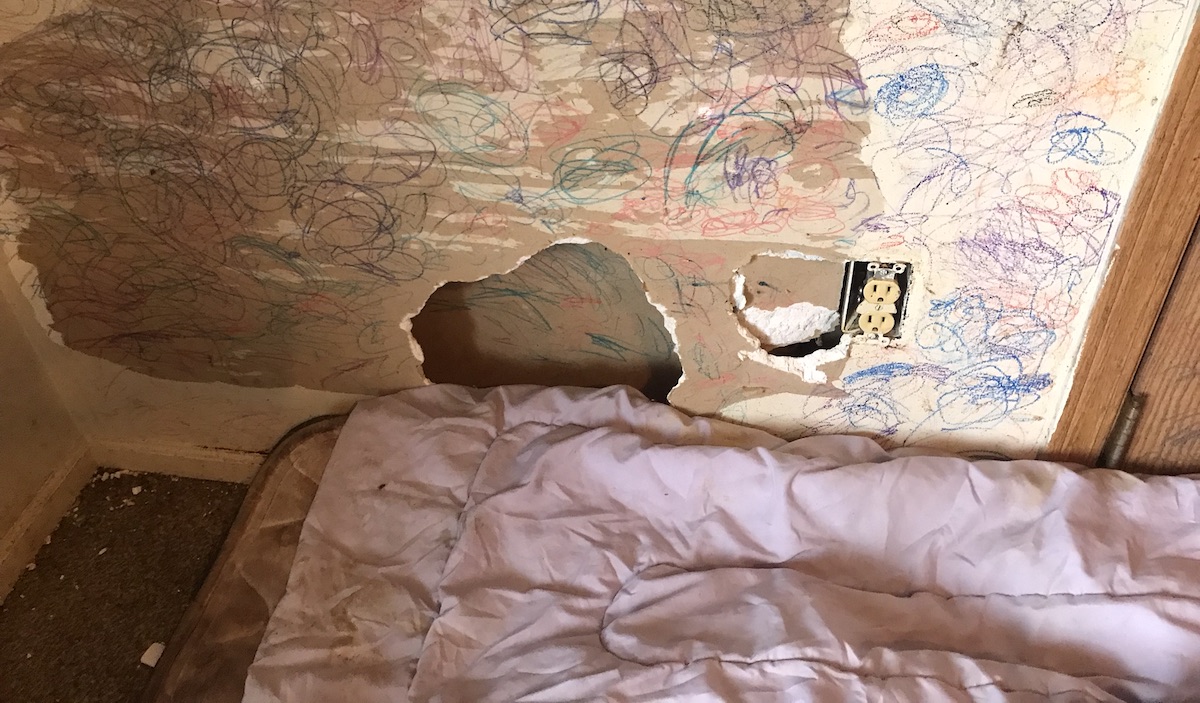
Health department officials took this photo of a severely damaged wall with a hole in it. There is exposed wiring directly adjacent to someone’s mattress. [Photo provided by Athens City-County Health Department]
The first problem, Eckles found, was that many of his clients had already fallen behind on their rent by the time the case reached his desk. In Ohio, nonpayment of rent is usually all a landlord needs to evict a tenant — even if the landlord has not fulfilled their obligation to maintain the property. Once the rent is a day late, nothing else matters.
Many of Eckles’ clients didn’t understand this. They thought that if their landlord didn’t maintain the property, they (the tenant) could compel the landlord to act by withholding rent. Instead, they just gave their landlord an easy way to evict them.
(Pay-to-stay ordinances, such as the one the city of Athens passed in 2022, can buy tenants some time to make the landlord whole, but the onus remains on tenants to pay up. Absent pay-to-stay, missing rent by even a day can be grounds for eviction.)
Instead of withholding rent, tenants in Ohio can try to force landlords’ hands by putting their rent in escrow. This is a formal process in which the tenant pays rent to a court, and the court holds the rent until the landlord fixes the property.
If Eckles got to a tenant fast enough, he could propose going the escrow route. But he found this approach could lead to retaliation he was largely powerless to prevent.
In theory, retaliating against escrowing tenants is illegal. In practice, landlords can often do so anyway thanks to the prevalence of month-to-month leases in southeast Ohio.
(By default, tenants are on a month-to-month lease unless a written lease specifies otherwise. Many substandard housing units don’t have written leases.)

Attorney Zack Eckles said it’s difficult for tenants to bring forward allegations against landlords when they are struggling just to stay housed. [James DeCamp Photography]
As the name suggests, month-to-month leases renew at the end of every month. They are sometimes seen as an advantage for tenants because they offer more flexibility than a yearlong lease. However, landlords can also choose to stop renewing a month-to-month lease at the end of any given month. This essentially means such tenants can lose their housing at their landlord’s whim, even if they pay rent promptly.
“They can evict you with just 30 days notice, no grounds,” said attorney McDaniel. “Even though, under Ohio law, you can’t retaliate against a tenant for requesting repairs, or enforcing their rights, they (the landlord) could say, ‘OK, I’ll make these minimal repairs, and I’ll do these things, but then in a month, I’m going to give you a 30 day notice and you have to be out of here in 30 days. If you don’t, then I can proceed to an eviction.’ And it’s hard, sometimes, to establish, and to convince a judge, or a magistrate, that this is retaliatory.”
Because there is an acute housing shortage, tenants whose leases aren’t renewed may not find a new place to live, period. Homelessness is a real possibility — meaning the threat of nonrenewal gives landlords a great deal of power.
Sure enough, Eckles saw that some tenants who put their rent in escrow suddenly found their landlords no longer wanted to renew their month-to-month leases. Eckles could occasionally convince a judge that this nonrenewal constituted retaliation, in which case the tenants could stay another month. However, the retaliation argument weakened as each month passed. Eventually, the landlord’s effort to stop renewing the lease would succeed.
Nor is this the only way landlords can retaliate against tenants. Attorney Peggy Lee said she has even seen landlords call children services on feisty tenants. It would not be unheard of for something like substandard housing to precipitate the removal of children in such cases.
A failure of regulation
One approach to discouraging retaliation from landlords is to implement a proactive rental inspection program. If inspectors regularly check up on properties, the thinking goes, landlords are compelled to maintain them and tenants don’t have to report as many problems themselves.
It’s a model local governments in the region have struggled to adopt. An effort in Nelsonville to create a proactive inspection program failed in the face of intense resistance, according to former code enforcement director Steve Pierson. And in 2015, a federal judge found Portsmouth’s rental inspection program violated the 4th Amendment, prompting that city to significantly scale down its code enforcement. Marietta is considering ramping up rental inspections, but that effort is still in its early stages.
The city of Athens is one of the only municipalities in southeast Ohio to create and maintain a truly proactive program. While it has its shortcomings, local housing experts agree that in general, rental properties within city limits are better maintained than those in the unincorporated parts of the county.
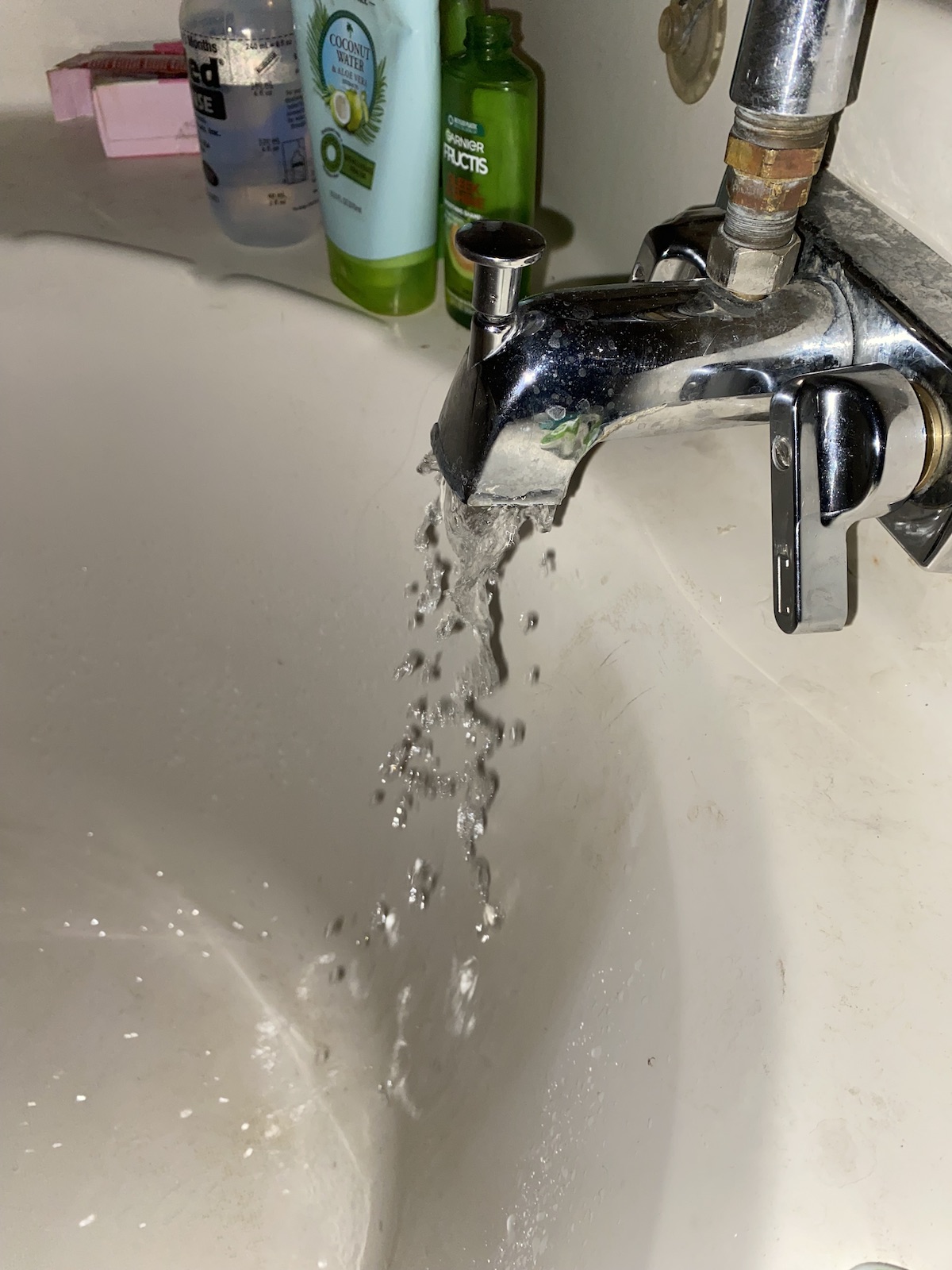
Anna said she couldn’t turn this faucet off, driving her water bill up and keeping her awake at night. [Photo provided by Anna]
The only rules governing housing in rural Athens County are a basic set of health and sanitation guidelines administered by the city-county health department.
“If you were to build a home here in Athens County, there really is no formalized process. … You decide on a design and hire a contractor and off you go,” said health department Administrator Jack Pepper.
Pepper is the first to say his organization is not equipped to provide the same services as the city of Athens when it comes to rental inspections. Health department workers can only take action if there is a clear threat to the tenant’s health and safety. In addition, they only inspect a property if someone complains, which leaves the door wide open to retaliation — something Pepper is well aware of.
“We really have to be very careful about how we do this work because, what’s worse? A roach infestation with a roof over your head, or no roof over their head at all?” Pepper said.
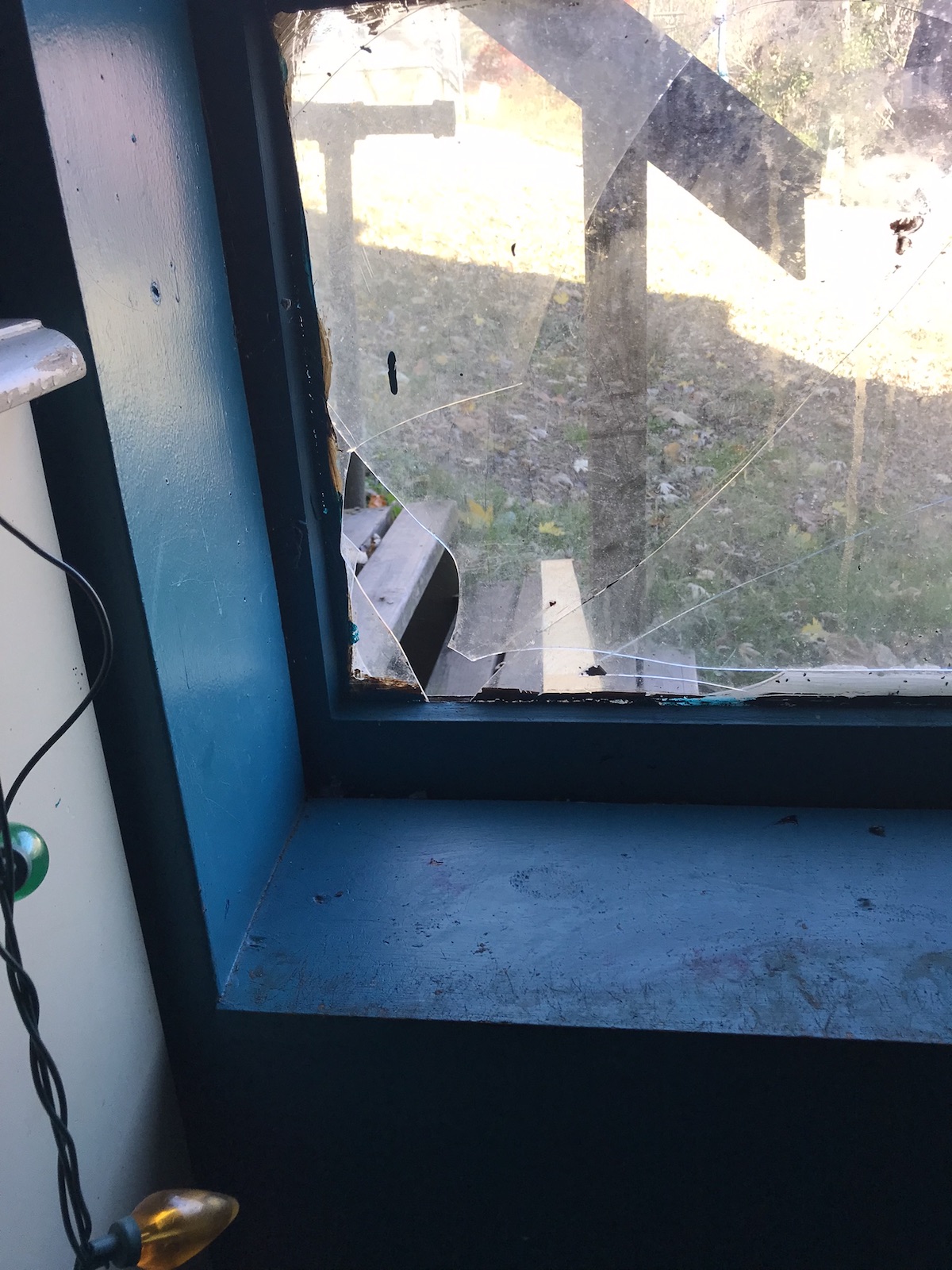
A broken window at a property visited by health department inspectors. [Photo provided by Athens City-County Health Department]
For this reason, health department workers regularly find themselves navigating tensions between landlords and tenants, trying to keep tempers from flaring while also ensuring the underlying problems with the home are resolved.
“We bend over backwards to make situations work,” Pepper said.
There is also a real possibility that a home will be so far gone by the time workers arrive that it must be declared unfit for habitation. Pepper said his workers have frank conversations about this with tenants.
“Again, we’re back to, is no housing better than what they’re currently living in?” Pepper said.

“It is a really, really difficult situation to figure out how to correct,” Jack Pepper, administrator of the Athens City-County Health Department, said of the area’s substandard housing problem. [Shamar Semple | WOUB]
This is a problem legal aid attorneys also run into.
“If I have a client who’s calling me and telling me, ‘Oh yeah, I don’t have heat,’ or there’s raw sewage, or there’s not a floor, or the roof is caving in — that’s going to get condemned. Code enforcement or the health department is going to tell them you can’t live here, and so now I’ve basically made my client homeless,” said attorney Caitlyn McDaniel. “It’s hard to feel like you’re winning when it comes to conditions, no matter what you do.”
Pepper is trying to improve the health department’s oversight where he can — for example, by adding plumbing inspections to the services the department provides. Even that, however, has proven challenging.
“I’m proud of what we pay people here, but I can’t compete with a quarter-million-dollar plumber salary,” he said.
Implementing a proactive rental inspection program for the entire county — either through the health department or some other entity — would likely require a substantial investment and face stiff opposition.
“Quite frankly, there’s just never been any appetite (for an inspection program),” Pepper said. “I think that it would be fair to make the statement that there’s a segment of the population in Athens County that really appreciates that they don’t have government oversight.”
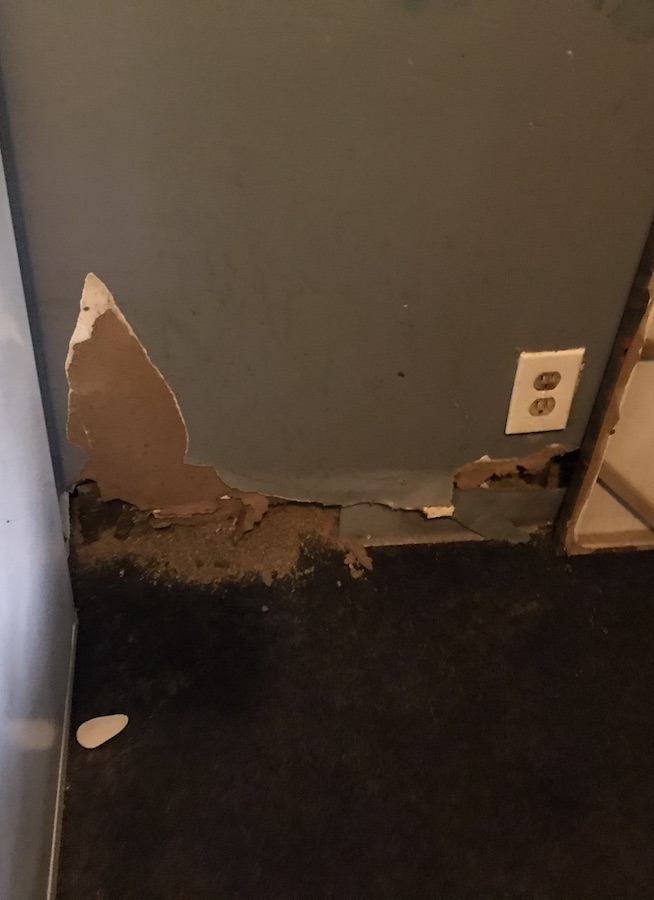
According to the health department, rodents were using this hole for harborage. The rodents did not cause the hole themselves. [Photo provided by Athens City-County Health Department]
It’s also not clear who, if anyone, would have the authority to do so. A little-known section of the Ohio Revised Code allows county commissioners to “adopt, administer, and enforce … an existing structures code pertaining to the repair and continued maintenance of structures,” but no county in Ohio has ever tried.
Athens County Commissioner Lenny Eliason said the statute doesn’t give commissioners the legal authority to create a proactive inspection program because it does not explicitly grant this authority.
“We have no home rule, so we can only do the things the state allows us to do,” Eliason explained. “If there’s no rental inspection program in a state code, we don’t have the ability to develop something outside what the state has.”
Others declined to comment on the code section in question because they were unfamiliar with it.

Athens County Commissioner Lenny Eliason suggested fixing the county’s regulatory problems would likely require action at the state level. [Shamar Semple | WOUB]
That means the only truly proactive inspections for rental properties in rural Athens County are those the federal government does every year for properties receiving Section 8 — a welfare program landlords have to opt into.
Among the basic conditions inspectors check are electrical hazards, gaping holes in walls or ceilings, threats to structural integrity and malfunctioning appliances.
Even these minimal requirements are more than some landlords are willing to meet.
“We do know of people who can’t get their HUD voucher to be honored because … the landlord will not do what HUD will require to be done in order to get the place even up to par,” legal aid attorney Lee said.
In many cases, Lee suggested, the landlords know they will be able to rent the properties even if they don’t meet HUD standards.
“If a landlord doesn’t have to pay to keep a minimum standard, and they’ll still get tenants willing to pay something to live in such deplorable conditions, what’s the incentive (to improve things)?” Lee said.

Attorney Peggy Lee has spent over 20 years working with low-income people in southeast Ohio. She said it’s harder now to negotiate with landlords than it was when she started. [Shamar Semple | WOUB]
It’s also worth noting that Anna’s trailer was able to pass multiple HUD inspections despite its many problems.
Pepper believes the fundamental problem is supply.
“There’s a shortage (of housing). We have a lot of people that are looking for housing and not enough housing stock, and their rents, particularly in the city of Athens and close to the city of Athens, tend to far exceed what people can really afford,” Pepper said.
That’s another reason many landlords don’t take Section 8. HUD will only reimburse up to what it considers “fair market rent” — a number the department calculates using a mix of data from the Census, the Consumer Price Index and private sources. The exact formula is not shared with the public. If a landlord thinks they can find a tenant while charging more than this, they have no incentive to take someone on a voucher.
Pepper added: “People, when they find good, reasonable rental housing … they do not leave. They stay there forever, because it’s so hard to find.”
No choice but to leave
The deterioration of the “matchbox” was not the only concern Anna had about her landlord.
“He thought he could walk in at any time,” she said. “I had a minor daughter at the time, you know what I mean? She was 14 years old … when I moved in.”
Anna felt there was something sinister in her landlord’s comings and goings. Her concerns worsened when her daughter started going to his house to work as a cleaner.
“We were over there one night, it was getting late and my daughter was in the kitchen washing dishes. And he had made a comment … talking about all these other girls’ — young girls — breasts, like them developing breasts and stuff. And that was our first, ‘What the hell?’” Anna recalled.
“Then he started making comments (to my daughter) like, ‘Oh, your boobs look like they’re getting bigger,’ or ‘Your butt looks, you’re getting a woman figure,’” she continued.
Anna’s daughter stopped going to the house to clean. Once, the landlord came to the trailer, where he made another comment about her daughter’s breasts.
“Only this time, her boyfriend was there,” Anna recalled. “He (the landlord) didn’t like it. He goes, ‘Oh, you’re not even supposed to be here.’ Well, if it wasn’t for that boy being here looking over my daughter, you would probably be still trying to get away with a lot more than if he wasn’t here.”
Anna said she heard similar stories about her landlord from other women. She told deputies about his advances, but nothing ever came of it.
She started keeping a baseball bat by the door, just in case.
Meanwhile, the maintenance problems kept piling up.
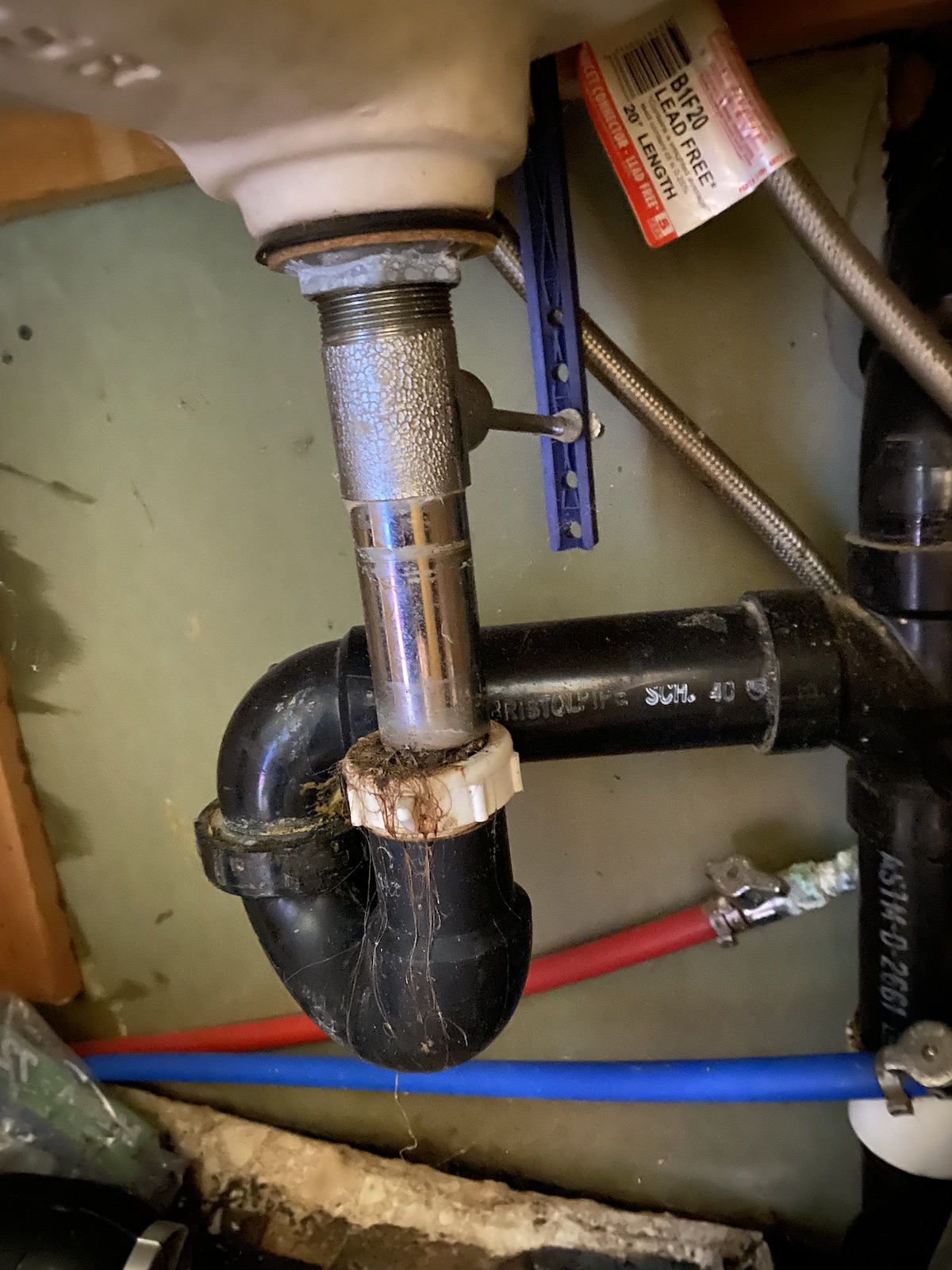
The drainage pipe under Anna’s kitchen sink was leaking, letting grime seep out and causing mold damage. [Photo provided by Anna]
“When we had this past little ice storm that we had, when it got really, really cold and everything froze up, my whole heater system went out,” Anna recalled. “So I was like, ‘If he ain’t going to fix it, I’m just going to take it out of the rent and he can deal with it. …’ And I was not waiting. My grandson was living in the home. There was no way I could wait. So I got two space heaters.”
At that point, Anna’s landlord probably could have evicted her. Fortunately for Anna, he did not. If he had, it’s not clear where Anna, her daughter or her grandson could have gone.
After a while, something in the trailer’s plumbing broke and Anna’s water bill skyrocketed to over a thousand dollars in one month. Anna’s landlord claimed she was at fault and refused to pay. Anna denies the allegation. She managed to get utility assistance from Hocking Athens Perry Community Action and some repairs were made, but months later, the water bill was still stretching into the hundreds. Anna’s daughter, who by then had found a new part-time job, helped cover the cost.
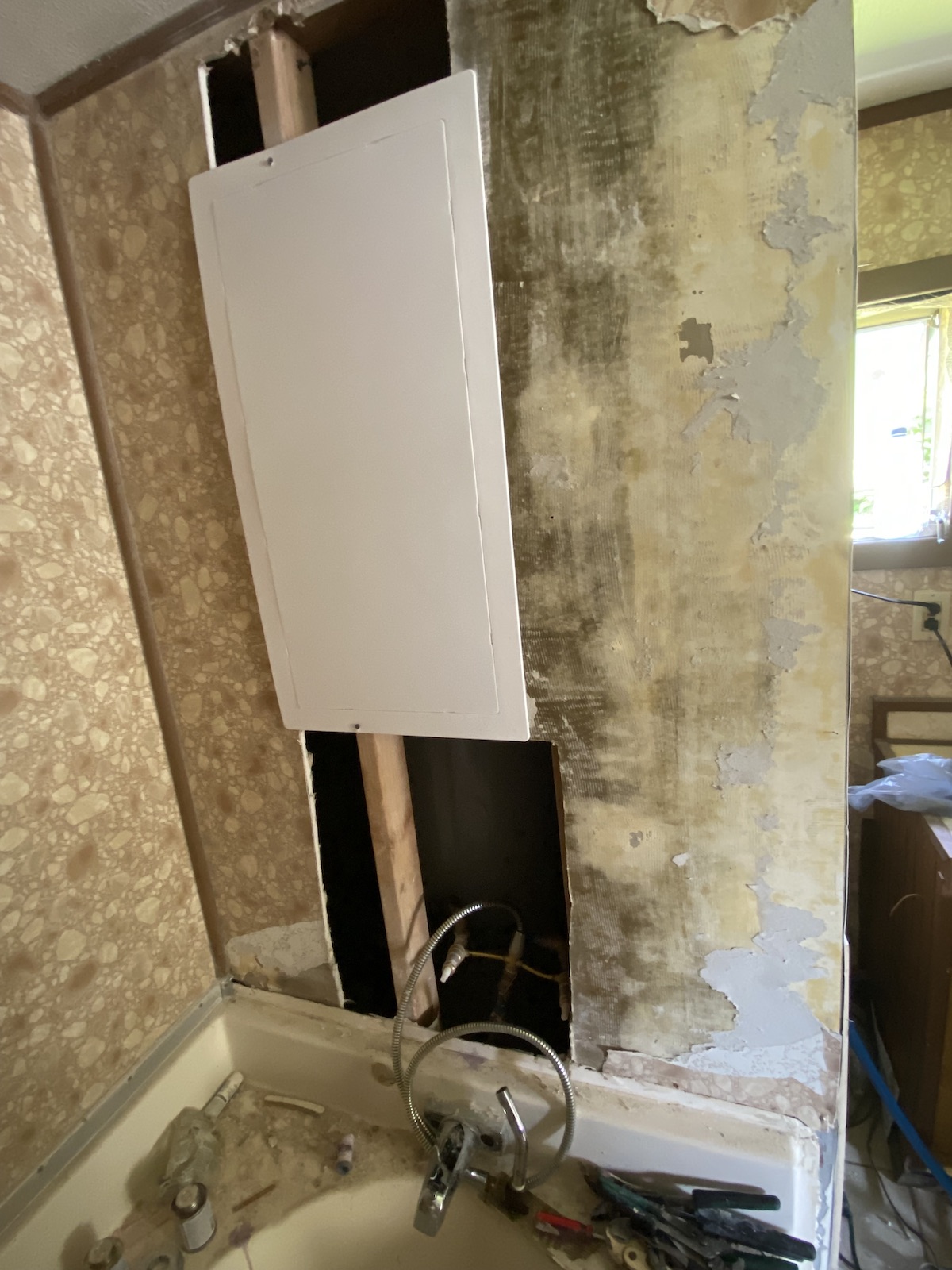
Anna said her landlord started replacing her shower plumbing but left the job unfinished for a month. [Photo provided by Anna]
Then it happened: The matchbox finally failed a HUD inspection. Anna could no longer use her Section 8 voucher to help pay her rent. She would have to start the arduous process of finding Section 8-approved housing all over again.
This search can take so long that Section 8 holders end up homeless. For that reason, Legal Aid of Southeast and Central Ohio actually cautions Section 8 voucher holders against terminating their lease, even with landlords like Anna’s.
Tenants who lose their voucher because they can’t find a place to live in time must go back on the waitlist for a new one — even if they are homeless.
New construction
But Anna had a stroke of luck.
On the outskirts of Athens, a freshly built apartment complex called Kershaw Greene was opening up just when she needed a new place to live. The apartments were constructed with Low Income Housing Tax Credits or LIHTC — meaning many offered significantly reduced rent for low-income tenants.
Anna sent in an application.
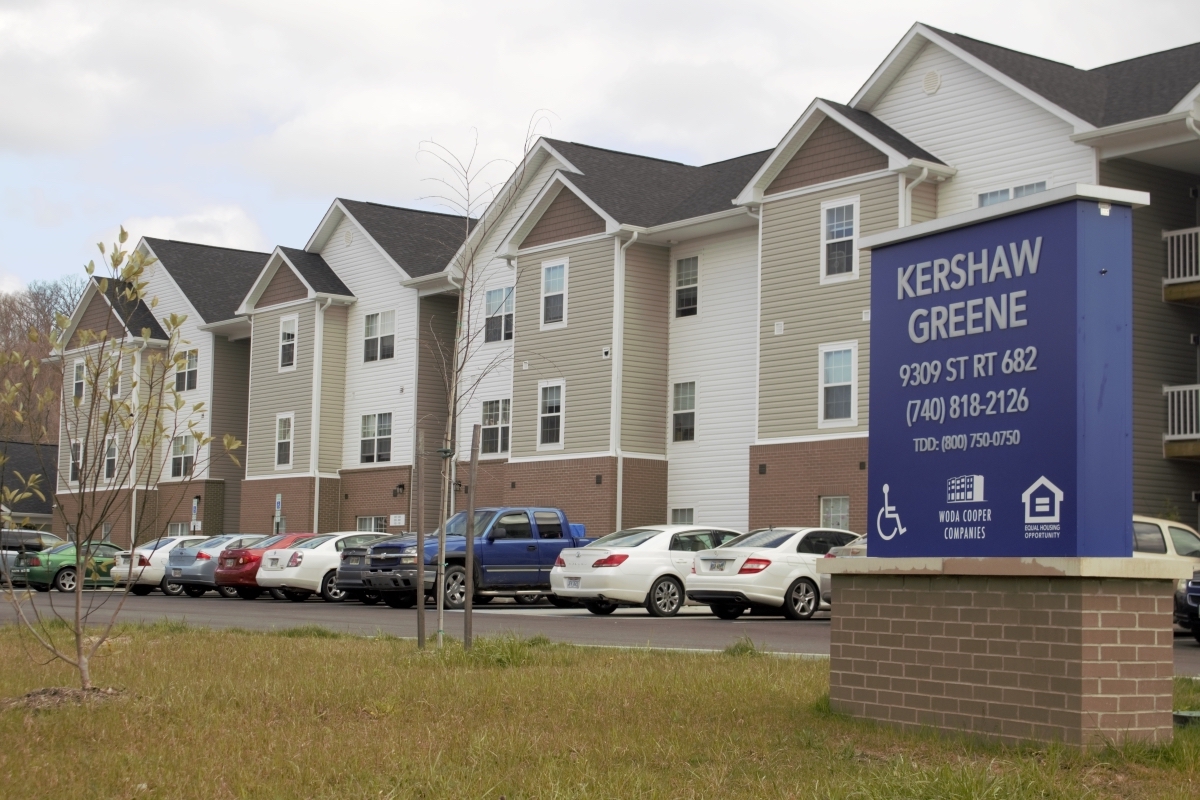
These are some of the finished three-story apartments at Kershaw Greene in Athens. They were built with the use of federal tax credits and are priced for low-income tenants. [Theo Peck-Suzuki | WOUB/Report for America]
Unlike Section 8, which covers the rent for an existing property, LIHTC essentially gives developers money to build new housing on the condition that they charge reduced rent for some of the finished units. The idea is to incentivize new construction that low-income tenants can afford. Multiple developers and housing experts said that without LIHTC, it would be impossible to set rents low enough for tenants like Anna and turn a profit on new developments.
In fact, even with LIHTC, making developments pencil out is challenging. A representative of Woda Cooper, the developer behind Kershaw, said the company sometimes goes to extraordinary lengths to keep LIHTC projects viable. For smaller, less experienced developers, the challenge may be insurmountable.
That’s partly why LIHTC hasn’t solved the affordable housing crisis on its own — and why Kershaw Greene is one of just a handful of recent LIHTC properties in the region.
Nevertheless, when LIHTC works, the benefits for local residents can be substantial. For Anna, getting an apartment at Kershaw Greene meant staying housed. It meant leaving the crumbling trailer she’d lived in for five years and moving to a space that was new and, hopefully, well made. It meant no more water in her sockets or holes in the wall.
Anna got the apartment. Her daughter got another in the same complex.
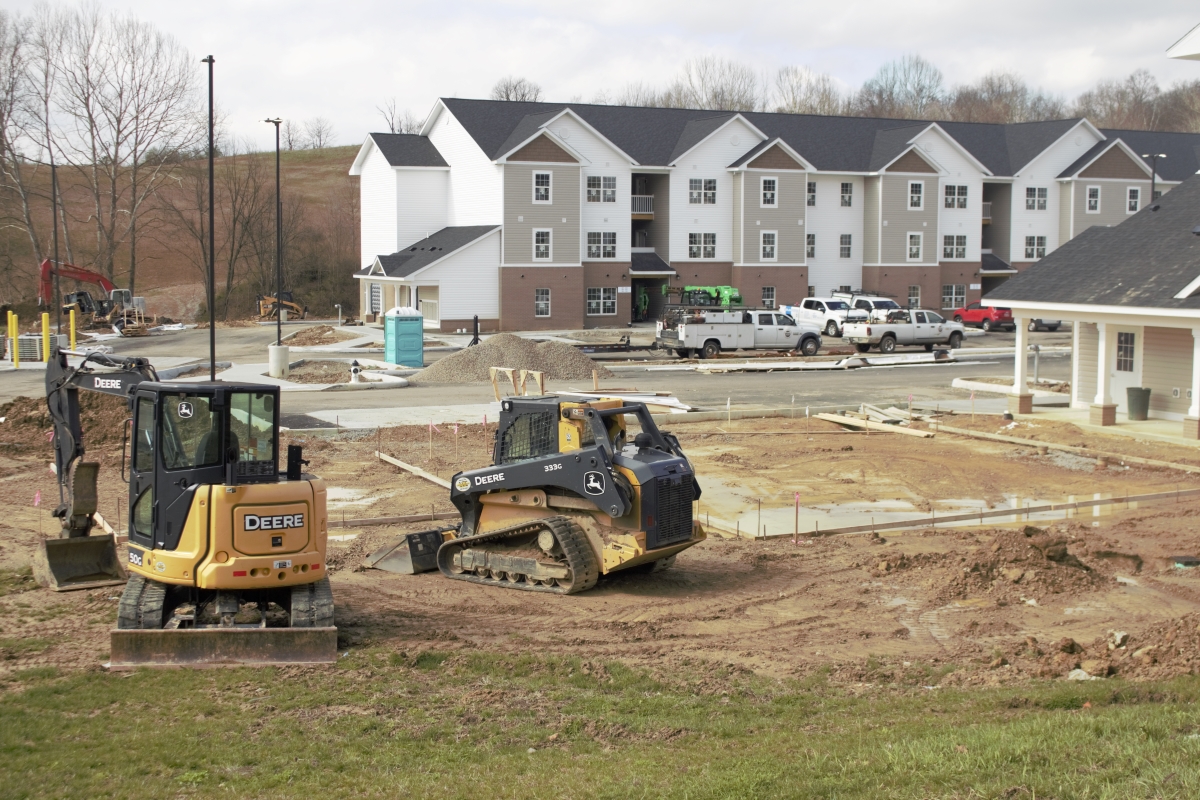
Kershaw Greene is being built in stages. When completed, there will be close to 400 units. [Theo Peck-Suzuki | WOUB/Report for America]
Anna supposed someone else would move into the matchbox after she left. But it wouldn’t be her.
“I’m glad to get out of there,” she said as her move-in day approached.
“I went downtown, not too long ago. I was invited, somebody invited me to their birthday party and I ended up getting two heart balloons. And so this is what me and my daughter did. We celebrated last night. I took the two balloons that I got from this party. They were going to pop ’em, and I’m like, ‘Don’t pop ’em. Don’t pop ’em.’ … Me and my daughter let those balloons off last night together as a, basically as a fresh start. … For new beginnings and letting go of the past and … more, better things to come.”
